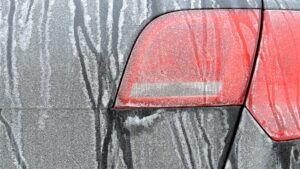Winter in Lincoln, NE, brings not only cold weather and snowy conditions but also a significant challenge for your vehicle: road salt. While essential for keeping icy roads and cold pavement safe for drivers, road salt can have a corrosive effect on your car. Proactively addressing this issue with the right winter car care tips is crucial to maintaining your vehicle in good condition throughout the winter season.
Here’s a detailed guide on how road salt impacts your car, and steps to protect it during the winter months.
How Road Salt Impacts Your Vehicle

Road salt is a chemical agent that lowers the freezing point of water, preventing ice from forming or breaking it down on icy conditions. While effective for road safety, it can create chemical reactions with your car’s metal components, leading to rust and corrosion.
- Undercarriage damage: The underside of your vehicle, including the exhaust system, is particularly vulnerable to salt damage due to its constant exposure.
- Brake pads and brake lights: Salt buildup can affect brake pads evaluation and compromise your braking system, potentially causing a safety hazard.
- Surface rust: Salt corrodes exposed metal surfaces, leading to paint chipping and rust spots that worsen over time.
Signs of Salt Damage
Keeping an eye out for signs of damage caused by road salt ensures you can address corrosion before it worsens. Look for:
- Rust on the undercarriage: Regularly check for rust patches underneath the car, especially near the exhaust system and suspension.
- Paint chipping: Salt can damage the paintwork, exposing the metal underneath to moisture and further corrosion.
- Difficulty braking: Salt accumulation can affect your car’s braking system, especially in extremely cold temperatures.
How to Prevent Salt Damage
Here are the best ways to protect your car from the harmful effects of road salt during harsh winters in Lincoln:
1. Wash Your Car Frequently
The most important auto maintenance task in winter is keeping your car clean. Regular washes remove salt buildup, especially from the undercarriage.
- Visit an auto repair shop or car wash with undercarriage cleaning options.
- Use a car cover if parking outdoors to reduce exposure to cold pavement and salt spray.
2. Inspect and Maintain Critical Areas
Routine inspections by skilled technicians can help catch issues early.
- Check the tread depth and tread patterns of your winter tires for better traction.
- Test critical fluids like engine coolant, brake fluid precision, and antifreeze levels to keep them at good working order.
- Inspect your cabin air filter and spark plugs to ensure efficient performance during the cold months.
3. Protect the Undercarriage
Applying a protective coating to the undercarriage before the winter season is a good idea. Anti-corrosion sprays act as a barrier against salt.
4. Keep Your Tires in Good Shape
Switching to snow tires or weather tires provides extra traction and ensures safer driving on icy roads. Schedule a professional tire inspection at a professional service center for optimal performance.
Winter Car Maintenance Checklist

Following a winter car maintenance checklist ensures your vehicle is ready for extremely cold temperatures and icy conditions.
- Battery Care
Car batteries are more likely to fail during colder weather due to slower chemical reactions. Schedule precise battery tests or visit an auto repair shop for battery expertise. - Fluid Management
Maintain proper levels of engine coolant, brake fluid, and windshield washer fluid to prevent freezing or clogging. Replace old fluids during an oil change to ensure smooth performance. - Wiper Blades and Lights
Upgrade to new winter wiper blades for effective clearing of snow and slush. Regular light inspection ensures that burnt-out bulbs or brake lights are replaced promptly for maximum visibility. - Check Tire Pressure
Fluctuations in temperature changes can cause air pressure to drop in tires. Keeping tires at the recommended PSI prevents wear and improves handling. - Carry an Emergency Kit
A car emergency kit should include jumper cables, an ice scraper, cat litter for traction, a first aid kit, and extra antifreeze levels.
The Role of Professional Winter Car Care
While DIY maintenance is essential, relying on professional winter car care services can address areas that require expertise. Professional service centers in Lincoln, NE, provide:
- Brake pads evaluation to check for salt-induced wear.
- Inspection of rubber compounds in tires for durability during cold months.
- Replacement of wiper blades upgrade and bulb replacements at an auto parts store.
Good News: It’s Never Too Late to Start
The good news is that it’s a great time to take care of your car, whether you’re preparing for the chill of winter or addressing mid-season wear. Winter-specific maintenance ensures your vehicle is in good condition and provides you with peace of mind during Lincoln’s harsh winters.
Conclusion
In Lincoln, NE, road salt is a double-edged sword. While it ensures safer driving in snowy conditions, it can also lead to corrosion and costly damage to your vehicle if left unchecked. Regular washes, routine maintenance, and professional care are the best way to protect your car during the winter season.
For comprehensive winter car maintenance services, visit your trusted auto repair shop in Lincoln, where skilled technicians will keep your vehicle in good shape. From tire inspections to critical aspects of winter car care, you can drive confidently knowing your car is ready for the challenges of winter.
